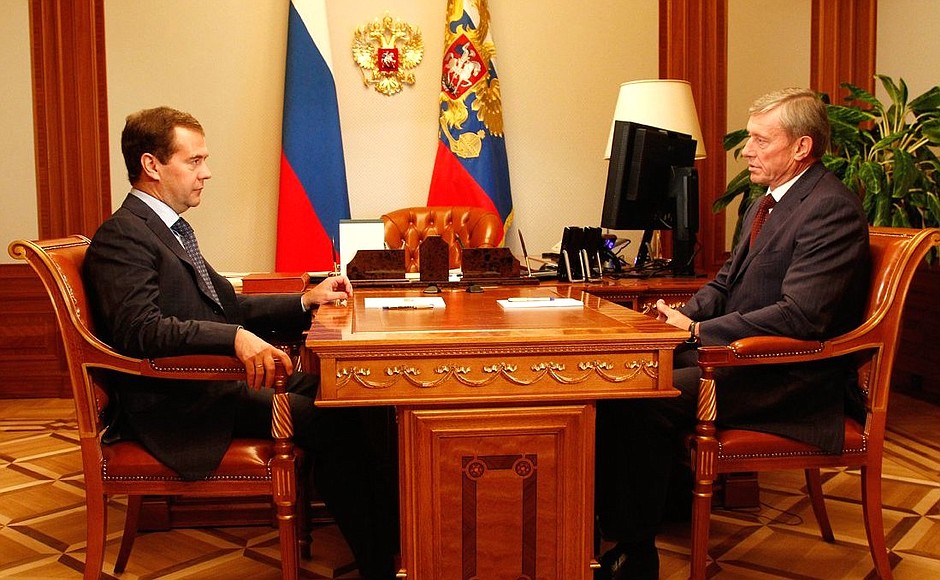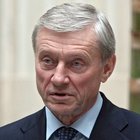
* * *
President of Russia Dmitry Medvedev: Mr Bordyuzha, we have an informal CSTO summit coming up. I want to hear in brief about the preparations for this event. It is to be an informal summit, and so there were no plans to adopt any particular documents at the event.
Secretary General of the Collective Security Treaty Organisation Nikolai Bordyuzha: Mr President, as we plan it, this summit will be limited to discussing the current situation in the Collective Security Treaty region. We have done a lot of work in this respect, including studying the situation in Kyrgyzstan, in the south of the country in particular. We have met with law enforcement and security officials there, visited all parts of the country, and met with the Kyrgyzstani leadership. We also visited Tajikistan and met there with the President of Tajikistan, and with the heads of all of the country’s law enforcement and security agencies. Similar work has taken place in Belarus and Armenia.
We have prepared quite a large volume of documents for the summit, mostly reference and information material, which we will present.
Regarding the issues of concern today, we have examined both the global challenges and regional problems. Of course, the uppermost concerns on our minds are the impact Afghanistan is having on the situation in the Central Asian region and the increased activity of extremist groups in this region.
One problem is that a sizeable number of young people from CSTO member countries are undergoing training in camps in Afghanistan and Pakistan. There is a threat of terrorist groups forcing their way into the Central Asian countries’ territory.
”Russia has an interest in bolstering the CSTO’s potential. This is the up-front and open line that we have always taken at CSTO summits, and I think this informal summit will be no exception.“
A second problem is of course the fundamentalist Islamic organisations’ activeness in the CSTO countries themselves and their efforts to win over new supporters, reaching into the social base in which these kinds of religious opposition groups and also terrorist groups take root.
We are also worried by the activeness of organised crime groups, especially drug trafficking rings. We have information too that a large part of the money obtained from drug trafficking is being used to bribe the authorities and establish contacts with extremist and terrorist groups in order to further their plans. If you recall, we had information that drug traffickers were playing an active part in events in the south of Kyrgyzstan, using their financial means and their supporters, and not just during the mass riots a year ago.
Overall, although the situation is stable in our view, there are nonetheless a number of trends of real concern, and we have drafted our proposals accordingly. Among other things, we studied the situation in the law enforcement and security agencies during our trips. Of course, each of the member countries has developed its own national security system, but a number of countries do require help in some areas. This help extends to military technical cooperation and military-economic cooperation in order to strengthen our common overall capability of responding to the challenges that we face.
We have a number of proposals in this respect. They cover the joint action that we need to take in order to neutralise the threats and challenges before us today.
Dmitry Medvedev: Russia has an interest in bolstering the CSTO’s potential of course. This is the up-front and open line that we have always taken at CSTO summits, and I think this informal summit will be no exception.
Of course we will go over the main regional threats and discuss the situation in the region in general and in the individual countries. At the summit a year ago we examined the situation in Kyrgyzstan, and I think that this time too we will discuss developments with our Kyrgyzstani partners.
For my part, I promised to brief our partners on the efforts Russia is making to influence the situation in North Africa and the Arab world, given that this is a very tense part of the world right now.
I am referring above all of course to the situation in Libya and a number of other countries, and to the Middle East in general. Russia is offering its services as a mediator and my plenipotentiaries are working on this in various parts of the world and in the countries in question. I will most certainly update our partners on all of this, because ultimately developments in North Africa and the Arab world have a direct impact on the situation in the CSTO countries too, especially on developments in Central Asia, and so we will definitely discuss these matters.
<…>
